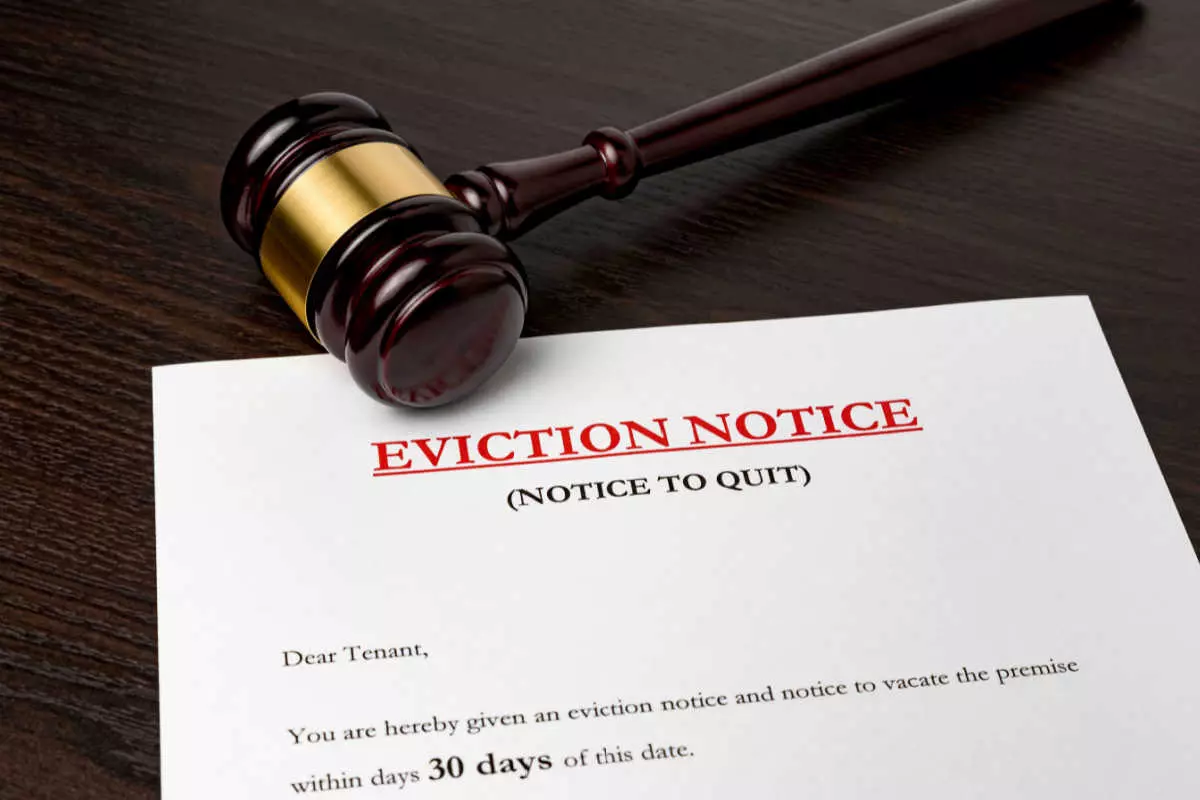Eviction Process and Rental Judgment: Tips to Pay off Debt
Are you in the middle of an eviction process now? Or have you just received your rental judgment? If you answered yes to one of those questions, you have come to the right place. In this blog, you will find all the necessary information to understand the process better, know your rights, seek help, pay off your debt, and increase your chances of renting again.
What Is an Eviction?
An eviction is a court-ordered removal of a tenant from the property in which they reside. In other words, it is a legal process a landlord uses to remove a tenant from rented property. A landlord can terminate a tenancy and evict the tenant for a variety of reasons, like
- Failure to pay rent
- Committing an illegal act on the premises
- Violating the lease or rental agreement
- Damaging property
What Happens During an Eviction?
Most states, including the cheapest states to live in, require landlords to give their tenants a written notice of rental termination. Once you receive the written notice of an impending eviction, you must vacate the apartment or negotiate a repayment arrangement. If you fail to leave the property or arrange a repayment plan, the landlord may file for an eviction in court.
Consequently, during the eviction process, the court may order your removal. If the court does issue a removal order, you may be forcibly removed from the property.
What Is a Rental Judgment?
A rental judgment is a legal ruling made by a court in a tenant-landlord dispute. It occurs when a tenant has failed to pay rent or has broken the terms of their rental agreement, and the property owner has taken legal action to recover what is owed.

Typically, the court will order the tenant to move out and may also award the landlord additional damages such as back rent, late fees, and damage costs.
The court order will often include an amount the tenant must pay the landlord to satisfy the debt. Additionally, the landlord may pursue further action if the tenant does not comply with the rental judgment. This could include wage garnishment, freezing of bank accounts, or other collection methods.
A rental judgment can have long-lasting consequences for tenants. It can affect their credit score and limit their ability to secure future rental housing. It can also make applying for loans, credit cards, and other financial products challenging.
What Is Eviction Debt?
Eviction debt, also known as a money judgment, is the sum of rent money the tenant is legally required to pay the landlord, plus interest. In other words, it is the amount you have missed paying when renting. If you also fail to pay off your eviction debt, collection agencies can start collecting the judgment. To avoid such unpleasant circumstances, you need to be informed about the different ways you can pay off your debt.
Five Ways to Pay Off Eviction Debt
Paying off eviction debt can seem overwhelming, but it is possible to manage it. The first step is understanding your rights as a tenant and ensuring the eviction is processed correctly. That said, here are five ways to pay off eviction debt:
Talk to Your Landlord
First, it’s always best to talk to the landlord who filed the judgment against you. For instance, if you are being evicted for non-payment, explain why you could not pay the rent. The landlord may be willing to set up a payment plan and remove the judgment. If they agree, make sure you get it in writing so you have proof of the agreement.
Contact a Credit Counselor
If you struggle to negotiate a settlement with the landlord, contact a credit counselor for help. A credit counselor can help you create a money and debt management plan. A credit counselor will audit your income, debt, and expenses to help you develop a budget to improve your financial circumstances.

As a result, if you set up a repayment plan with your landlord, a credit counselor can help you take actionable steps to manage your funds appropriately to meet your payment terms.
Seek Help from Nonprofit Organizations
Another option is to seek assistance from a nonprofit organization or government agency, such as the Legal Services Corporation, which helps tenants find a legal aid clinic near them. Some nonprofits, such as the Community Development Corporation and the Resident Relief Foundation, provide rental assistance to qualified tenants during financial hardships.
Contact the Collection Agency
Consider contacting the court or collection agency that issued the judgment report to make sure that the judgment is accurate and up to date. If it is not, you may be able to dispute it with the credit bureau or collection agency and have it removed. However, only verifiable mistakes can be disputed and possibly removed.
That said, the Fair Credit Reporting Act allows individuals to dispute inaccurate judgments on their credit reports directly with the credit bureaus or creditors. To do so, you must complete the dispute form on each credit agency’s website. After you submit the dispute, the credit reporting company must investigate your claim within 30 days. If the bureau finds the information correct, they will remove the collection account from your report.
If the collection account is accurate, you can clarify with the agency how much is owed and by when. Then, figure out how much you can pay every month and adjust your budget accordingly. Afterward, set up a payment plan with the collection agency and make timely repayments. In addition, make sure to document everything and have a written copy of your agreement contract to protect yourself in case something unexpected happens.
When you have paid off all your debt, request a letter of completion from the collection agency. Then, check your credit report to ensure your account has been accurately updated. However, keep in mind that changes may not appear for 30 days.
When you pay off a debt, the debt collection agency will notify the credit reporting agencies that your account is now paid in full. Nonetheless, keep your letter of completion in a safe place if you ever need to provide proof in the future.
Seek Legal Advice
Another option is to get a lawyer to help you understand your rights and options and any potential defenses you may have. A housing attorney may negotiate a settlement that can result in the judgment being removed from your record or reduced so that it won’t harm your rental history.

You can utilize the following legal resources if you find yourself struggling to pay off eviction debt:
- Legal Services Corporation and National Association of IOLTA Programs: Lists of legal aid offices
- Free Legal Answers: Email-based legal answers from volunteer attorneys
How Does an Eviction Affect Your Credit Scores?
An eviction won’t affect your credit score if your landlord doesn’t report your eviction to any of the three consumer reporting agencies: Equifax, TransUnion, and Experian.
However, if your displacement was caused by your failure to pay rent, your landlord can sell your debt to a collection agency, which then reports your debt to the three credit bureaus. If the outstanding debt is sent to a collection company, it will appear on your credit report and negatively affect your score.
However, if you have been wrongly evicted, you can dispute the collections account, and you may be able to remove it from your credit report.
Are Eviction Records Public?
Eviction orders have appeared in public records for seven years, such as on tenant-screening services, background checks, and government websites. Landlords can use the information on these websites to screen potential tenants. As a result, an eviction on your rental record can also hurt your chances of renting another property in the future.
Final Thoughts
If you have been recently served with an eviction notice or a collection notification, there are immediate steps that you can take. First, reach out to your landlord and try to negotiate a payment plan. Next, contact the collection agency to dispute or pay off your debt. You may also want to check out our budgeting tips for renting an apartment to minimize the risk of dealing with eviction debt in the future.
FAQ
What Should I Do After Receiving An Eviction Notice?
If an eviction lawsuit has not been filed against you, you can:
- Get help with rent and utilities through state or local organizations, like the Emergency Rental Assistance Program.
- Talk to your landlord to find out if they are willing to work on a repayment plan.
- Check state and local laws that could delay your eviction while you get help.
If an eviction lawsuit has been filed against you, you can:
- Speak with a lawyer to understand your rights and possible defenses if you are wrongly evicted.
- Get help with rent and utilities through state or local organizations. Federal and local programs include the Housing Choice Voucher (HCV) program and the Department of Housing and Urban Development’s (HUD) Public Housing program.
- File a written answer, ideally with the help of a lawyer, explaining to the court why you should not be evicted. The judge may delay or dismiss the eviction notice if you have applied for rental assistance and are waiting for a decision.
If the court has ordered your removal, you can:
- Get help from your local rental assistance program to help you cover moving costs, a security deposit, or application fees. These include the Rural Housing Service and the Federal Relocation Assistance Program.
- Ask the judge if they can place the eviction order on hold while your application for emergency rental assistance is being processed.
State-Specific Resources to Help with Eviction Debt
How To Rent With An Eviction On Your Record?
A landlord might hesitate to rent to someone with a bad rental history. Nonetheless, there are many ways to rent again after an eviction.
For example, you can rent with a forgiving property management company that offers customized rental agreements unique to each person’s financial situation, allowing new residents to rebuild their credit after eviction.
If possible, you could also pay a couple of months’ rent in advance to increase your chances of renting after an eviction.
Lastly, you can consider getting a cosigner or roommate with good credit and rental history.
How Can I Improve My Credit Score After An Eviction?
Here are three ways to rebuild your score after an eviction:
- Pay your bills on time to add positive repayment history
- Lower your credit utilization ratio
- Check your credit report for incomplete or inaccurate information listed. If you find an error, dispute it with each credit bureau that includes it
How Long Does An Eviction Stay On Your Record?
An eviction can stay on your rental record for seven years.
What Happens After an Eviction Judgment?
After the eviction judgment, you are expected to receive a Writ of Restitution. This document authorizes the U.S. Marshals Service to schedule an eviction. After that, the U.S. Marshals Service will contact you to schedule the removal.
Remember, your landlord cannot evict you unless they schedule an eviction through the U.S. Marshals Service.
How To Remove A Rental Judgment?
Unfortunately, you cannot remove a rental judgment from your record.
Table of Contents
- What Is an Eviction?
- What Happens During an Eviction?
- What Is a Rental Judgment?
- What Is Eviction Debt?
- Five Ways to Pay Off Eviction Debt
- Talk to Your Landlord
- Contact a Credit Counselor
- Seek Help from Nonprofit Organizations
- Contact the Collection Agency
- Seek Legal Advice
- How Does an Eviction Affect Your Credit Scores?
- Are Eviction Records Public?
- Final Thoughts
- FAQ
- What Should I Do After Receiving An Eviction Notice?
- State-Specific Resources to Help with Eviction Debt
- How To Rent With An Eviction On Your Record?
- How Can I Improve My Credit Score After An Eviction?
- How Long Does An Eviction Stay On Your Record?
- What Happens After an Eviction Judgment?
- How To Remove A Rental Judgment?